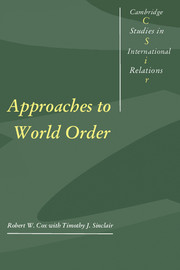Book contents
- Frontmatter
- Contents
- Preface
- Acknowledgements
- Part I Overviews
- Part II Theory
- 3 The idea of international labor regulation (1953)
- 4 Realism, positivism, and historicism (1985)
- 5 On thinking about future world order (1976)
- 6 Social forces, states, and world orders: beyond international relations theory (1981)
- 7 Gramsci, hegemony, and international relations: an essay in method (1983)
- 8 Towards a posthegemonic conceptualization of world order: reflections on the relevancy of Ibn Khaldun (1992)
- 9 “Take six eggs”: theory, finance, and the real economy in the work of Susan Strange (1992)
- Part III Interpretations
- Part IV Multilateralism
- Complete bibliography of works by Robert W. Cox to 1995
- Index of names
- Index of subjects
- CAMBRIDGE STUDIES IN INTERNATIONAL RELATIONS
9 - “Take six eggs”: theory, finance, and the real economy in the work of Susan Strange (1992)
Published online by Cambridge University Press: 05 June 2012
- Frontmatter
- Contents
- Preface
- Acknowledgements
- Part I Overviews
- Part II Theory
- 3 The idea of international labor regulation (1953)
- 4 Realism, positivism, and historicism (1985)
- 5 On thinking about future world order (1976)
- 6 Social forces, states, and world orders: beyond international relations theory (1981)
- 7 Gramsci, hegemony, and international relations: an essay in method (1983)
- 8 Towards a posthegemonic conceptualization of world order: reflections on the relevancy of Ibn Khaldun (1992)
- 9 “Take six eggs”: theory, finance, and the real economy in the work of Susan Strange (1992)
- Part III Interpretations
- Part IV Multilateralism
- Complete bibliography of works by Robert W. Cox to 1995
- Index of names
- Index of subjects
- CAMBRIDGE STUDIES IN INTERNATIONAL RELATIONS
Summary
In the April 1970 issue of the Chatham House journal International Affairs there appeared an article by Susan Strange entitled “International Economics and International Relations: A Case of Mutual Neglect.” In retrospect, it has the appearance of a manifesto. It challenged the dividing and enclosing practice that is characteristic of academic disciplines. It pointed to a gap in understanding of the economic power relationships that underpin world politics. It directed the way towards the definition of an area of study that soon became identified as international political economy.
Academia, in turn, moved to assimilate and consecrate IPE as yet another compartment of knowledge with its own certified practitioners. New orthodoxies watched over by new hierarchies of initiates took charge of it. Susan Strange never gave them her official blessing. They never succeeded in taming her iconoclasm. She continued swift as a corsair to harass the plodding convoys of the new conventional thinking.
Her initiative of 1970 was followed up by other authors in a variety of ways. It found a response among some political scientists who began to explore international economic relations as a special sphere of politics – the methods of political analysis brought to a new domain. An early major textbook by Joan Spero, published first in 1977, is called The Politics of International Economic Relations Much American scholarship continued to be grounded in political science perspectives, in the framework of actors and interactions, the political processes of international economic relations, who does what to whom.
- Type
- Chapter
- Information
- Approaches to World Order , pp. 174 - 188Publisher: Cambridge University PressPrint publication year: 1996
- 8
- Cited by



